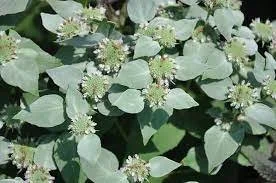June’s Native Maryland Plant
Pycnanthemum muticum
(pik-NAN-thee-mum mu-tee-kum)
Common Name: Short-toothed/Clustered Mountain Mint
What’s all the buzz? Pollinator week (June 20-26) is this month - awesome! Another reason to celebrate pollinators, especially bees, and rejoice in the ecosystem services they provide. In addition to pollinating over 85% of flowering plants, bees improve or stabilize 75% of crop yields (mainly fruits, vegetables, and nuts). When it comes to native bees, their contribution goes well beyond pollinating plants for humans to eat; they also support the growth of trees and other plants that create healthy habitats for all species, which increases biodiversity and sustains the complex food web that we all need. Native bees are especially valuable since they are three times more efficient than honeybees. Native plants are essential for native bees because, unlike many ornamental and nonnative plants, they reliably produce the nectar and pollen on which bees depend. The impact of their pollination results in better air and water quality for everyone.
Pollinator week is also about raising awareness and taking action to support all pollinators – we need them, and they need our protection. The Maryland Native Plant Society designated 2022 as the year of the mints (1). Taken together it seems right that we should be planting mints in our gardens to sustain an abundance of pollinators. Pycnanthemum muticum is one such mint. It’s an adaptable, wonderfully aromatic plant that I use in a swale in front of my home, allowing school students to marvel at the diversity of life it supports as they make their way to the bus stop. Elsewhere I use it in partly forested areas along the edges of my property and in my pollinator garden with other longstanding plants that won’t be overtaken by its tendency to spread; it’s also deer resistant, a valuable feature of most mints.
Do your part this month (don’t just lie there!) – stand up for pollinators, don’t fear them and don’t be afraid to plant this mint either. You’ll benefit many pollinator species and create a healthier environment for everyone.
1-MD Native Plant Society: https://mdflora.org/resources/Publications/Marilandica/Marilandica_Fall_2021.pdf
Alison Milligan – MG/MN 2013
Watershed Steward Class 7, CBLP




